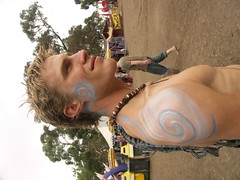Timor, where the sun rises
Reflections from Timor, where the sun rises...
Security was the main concern I had before embarking my journey to East Timor. I had been eager to assist in the installation of solar systems in a country in desperate need of infrastructure, but in the month leading up to my visit it seemed that Timor was again revising the troubles that have plagued its independence. Notionally aware - having travelled through Turkey, Indonesia, and the Middle-East against the advice of the Australian Government - that insecure locations are typically geographically constrained, and one need only avoid war fronts (and five-star hotels), I was generally happy to continue my mission East Timor. However, when it arose that much of the conflict was occurring in the very region that I was headed, and that after a vehicle was attacked en route to Viqueque the UN had ceased driving through the region in favour of using helicopters, I re-thought my itinerary. I was assured that Dili and the surrounding areas were all stable; consequently my activities focussed on this region, though - as it arose - things seemed to have settled in Viqueque by the time I arrived. Following, then are some interesting insights about the country of Timor Lorosae (translation: where the sun rises) whatever you call this country, it matters not , for the word Timor itself means East.
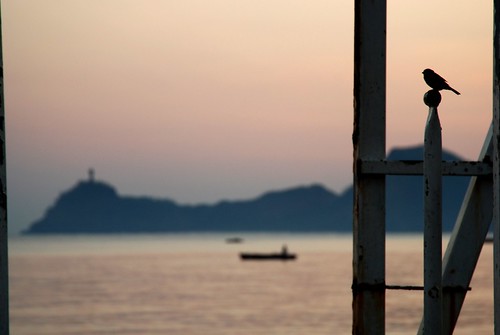
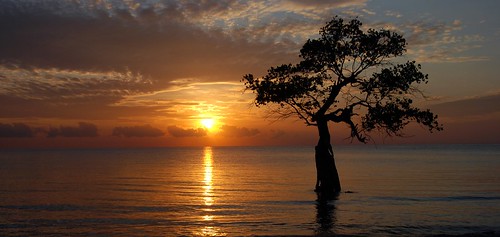
The streets of the capital, Dili, were notionally very safe. Although there were quite a number of internal refugee camps modest places at best, but progressively less squalid as aid agencies installed sanitation units it appeared that life continued as normal for many, with some evidence of refugees settling down in the camps: most notably those small number of refugees who donned business suits to work for international NGOs, before retiring to their tent later that evening. It was only late at night that one might have guessed at a security problem, for at 8pm the streets went deathly quiet. We were caught out one night: having eaten late at a restaurant, we found the streets bereft of taxis, and our hostel lay some 7km away. With little other choice, we set out to walk home, dodging coffin-sized potholes in the dimly-lit streets whilst I nursed a foot with its sole torn open from a local barefoot basketball match earlier that afternoon. We werent sure whether the sight of flashing blue lights and the Australian army in the direction of our travel was a good sign, though the pimple-faced soldier we spoke with assured us that the night was dead, before turning his attention back to the local young women that seemed to be impressed by his uniform. Fortunately, it wasnt much further beyond this point before we passed a gathering of young men nearby a number of cars, and with a swift bit of negotiation we secured ourselves an impromptu lift home. Our saviour in this case may have been the absence of street lighting in that stretch of road, for had we been able to see that they were sitting out front of what must have been the most burnt-out building in Dili, we may not have jumped in that kind young mans car. But, one does get desensitised to the sight of burnt-out buildings in Dili...
The most-recent spate of troubles, not Timors first, owed itself to the most popular political party failing to secure a place in the government, despite winning the greatest share of the vote (40%). Politically-incited violence erupted like a wave across the country, though not for the first time. People we spoke with had varying beliefs about the reason Timor seemed to be infected with violence, some pointing to the anger and frustration of having access to so much oil wealth without yet receiving benefit, or boredom associated with unemployment creating a simmering problem of dissent. Others suggested that the Indonesian occupation had suppressed the ability of people to seek retribution for perceived wrongs inflicted by neighbours, thus the violence was opportunistic, the natural culmination of decades of enforced peace in a society pre-disposed to retribution. Whatever its cause, terrorism it was not, but neither was it conducive to investment or TOURism.
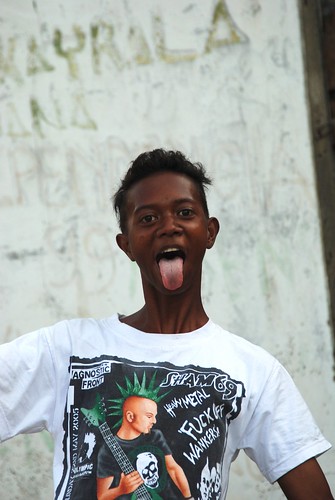
With an uneducated population and few income generation opportunities other than oil wealth and a export market for high quality organic coffee, tourism is a necessary focus for Timorese development. It is a pity that the country hasnt been stable enough to encourage tourists, for in many regards tourism is a natural opportunity. A country with some brilliant natural beauty, including enviably unspoilt diving reefs, eco-tourism could be a sure-fire winner, if sustainably managed. Timor has also, as yet, been unspoilt by tourism you pay the same price as locals almost everywhere, theres no haggling or hassling, and wherever you go youre welcomed by squadrons of young children all eager to pose for photos. Any flash that erupts from a camera causes an eruption of cheers. This creates a welcoming experience untarnished by the negative experience you often face throughout south-east Asia. Its not all tourist utopia - deforestation and lack of garbage collection can despoil what is otherwise a beautiful land blessed with its own unique Eucalyptus species. Timor is also significantly more expensive than its neighbours, a problem compounded by its use of the American dollar as local currency, and the inflation that occurs whenever so many foreign NGOs concentrate in one region. The white 4WDs with clear UN markings charging up and down the narrow streets are another less-pleasant impact of foreign visitors; though (as we found) the sense of being elite that is gained from the money that foreigners such as ourselves command in a subservient society contributes somewhat to the enjoyment of the place a feeling of being rich that must have intoxicated colonial rulers worldwide.
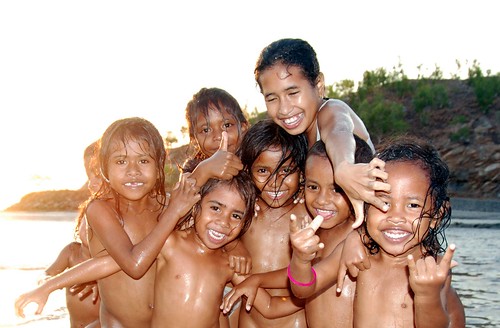

Fortunately, we were able to get real at an eco-resort, an exemplary model of sustainable tourism that was struggling to maintain its democratic constitution in the face of tribal politics on the island of Atauro. It was here that a group of volunteers had installed solar lighting systems, and for this reason we were understandably eager to return to check up on the systems (youll understand why when you see the photos). Our actions in East Timor had otherwise been curtailed by the late delivery of the container of equipment we were set to install; instead we focussed our attention on identifying training possibilities for the locals to ensure the long-term sustainability of installations. The Alternative Technology Association had put in many systems over previous years without paying enough attention to enabling their maintenance, an oversight they wished us to assist in correcting. This gave us license to speak with many interesting people with some relevance to sustainable development and solar energy ; Aires, who had spend 20 years in Sydney repairing microwave ovens before returning to Timor to install solar and biomass systems, all the while creating beautiful art; Gonzalo who must have had the only private backyard swimming pool, notionally to treat the bamboo he was buying from farmers in the process of establishing an export market for the product; Wolfgang, who was developing a secure compound to host foreign dignitaries from neighbouring embassies (notionally to assist the sales of his high-quality water treatment and solar pumping equipment); Jonathan who was making biodiesel from waste vegetable oil produced by the Australian army kitchen; Father Thomas, whose Don Pedro mission was providing enviable technical education to many children; and Pedro, the host of our hostel in Dili, which had been a base for freedom fighters and journalists throughout Indonesian occupation. These people opened their doors to us because we were attempting to help them assist East Timor, resulting in rich conversations and insights a tourist would never attain. So, having established the contacts necessary to create a solar installation and maintenance training course, we earned our R&R.


The tourism we did gave us further insight into Timorese culture, of which children play a significant part - with an average of eight children per couple, its little wonder! Most are living in very poor conditions, resulting in frequent infant and maternal death. Those that make it through have a lot to smile about, and the children we saw behaved impeccably the truck we rode home from the beach in one night was full of perhaps 25 children, none of whom had kicked up a fuss when mum had said its time to go, something impossible to think of in Australia. However, with such few opportunities, child trafficking is becoming an increasing problem, something we contributed to (tongue in cheek) by carting a ute-load of kids up the hill to school one day, saving them an 3km walk; on our return we gave three women and their 20kg sacks of rice a lift of about 20km, much to their pleasure. Riding in the back of a truck is also a cultural phenomenon, although sitting on metal benches while trucks get airborne over some of the rutted roads must take its toll on the body. Unfortunately, the Portugese didnt install much infrastructure (such as roads) during their reign. The Indonesians installed roads, health centres, and electricity; much of which they destroyed when they left the country. As a consequence or poor quality infrastructure and limited ability to pay for upgrades or running/maintenance costs, electricity typically runs only 6 hours a day, also the only time when mains water is available, meaning that taps and lights are left on by the householder. Such is the Timorese unfamiliarity with modern infrastructure that we witnessed a police van, blue lights flashing with extreme urgency, stopped at a traffic light waiting for it to change. Unfortunately, the Indonesians didnt provide much training of the local population, preferring to treat them as no more than human labour. The populations low technical ability makes it difficult to maintain complex solar systems, and with some 800 being installed by the government and UNDP, we devoted our energies to the establishment of training of service personnel who will now be able to earn a living maintaining this critical mass of systems. But the most touching experience was seeing the effect such training can have on one single person.
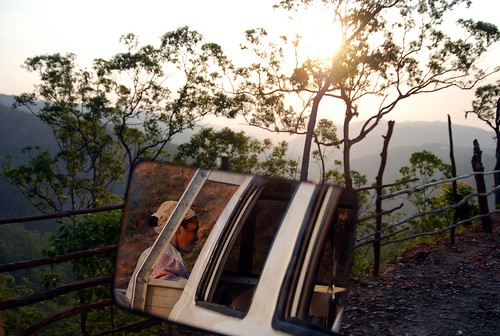
Given that we had plenty of time on Atauro, we were able to improve the existing systems, in the process dismantling and reconnecting each in a uniform way. Jonniko, A local worker at the eco-resort demonstrated enthusiasm, and we gladly took to instructing him. Such was his desire to learn that it wasnt uncommon for us to find Jonniko improving a system while wed been having a kip. Over the course of 3 days, we extended the existing system, providing additional energy services, making maximal use of Jonnikos rapidly developing ability to troubleshoot systems. Jonniko extended his gratitude to us with tears of thanks in his eyes, overcome with emotion not only at being given the opportunity to develop his skills and earning potential, but more significantly (we feel) at the experience of being treated as someone equal, someone able, a valuable human being, something he would not have experienced during Indonesian times.
I'll leave you with a timeless picture of Timor... As always, plenty more amazing photos at http://www.flickr.com/photos/beautifulworld/sets/72157602220513647/
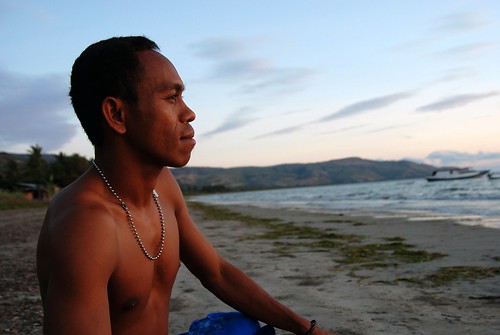
Warwick
